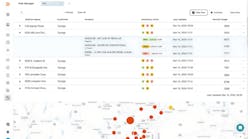Transport Capital Partners LLC (TCP) has completed its Business Expectation Survey for the third quarter of 2010, which found that 63% of responding carriers experienced rate increases, with 7% reporting more than 15% rate increases.
“It is clear actual rates have finally been increasing for the last two quarters,” said Richard Mikes, TCP partner. He added that it is significant that 17% reported rate increases of 10% plus.
TCP uses the quarterly survey to collect insights and opinions of executives nationwide in order to report on the current state of the industry and future expectations.
“While we saw a modest decrease in future rate increase expectations this quarter, more than 2/3 of respondents still expect line haul rates to go up in the next year,” said Lana Batts, partner for TCP.
“Smaller carriers have not seen their rates increase as much as large ones,” said Mikes. “We are surprised about this, as in the spot market where backhaul rates rose first and the most dramatically, there is little differentiation between small and large truckers in this more instantaneous semi-electronic environment.”
In addition to line haul rates, more than 2/3 of carriers expect to renegotiate fuel surcharges, detention charges, quicker payments, and a move to practical miles.
“An example of these industry changes can be seen with shippers who have historically insisted on unrealistic shortest mileage calculations. In the current climate, they will feel pressure from carriers to switch to the more realistic practical miles, which are acknowledged as the predominant routing and driver payment methods,” said Batts.
With many carriers opting not to add trucks, maximizing equipment utilization to move more freight becomes crucial. Mikes and Batts both conclude that this very limited capacity may be the precursor for a new era of shipper carrier coordination with improved utilization of equipment.
Batts said, “Carriers know that operating costs that have not been reimbursed in the past are now open for discussion and negotiation. We expect to see more merger and acquisition activity as carriers try to cope and take advantage of the new environment.”
More information is available at www.transportcap.com.








